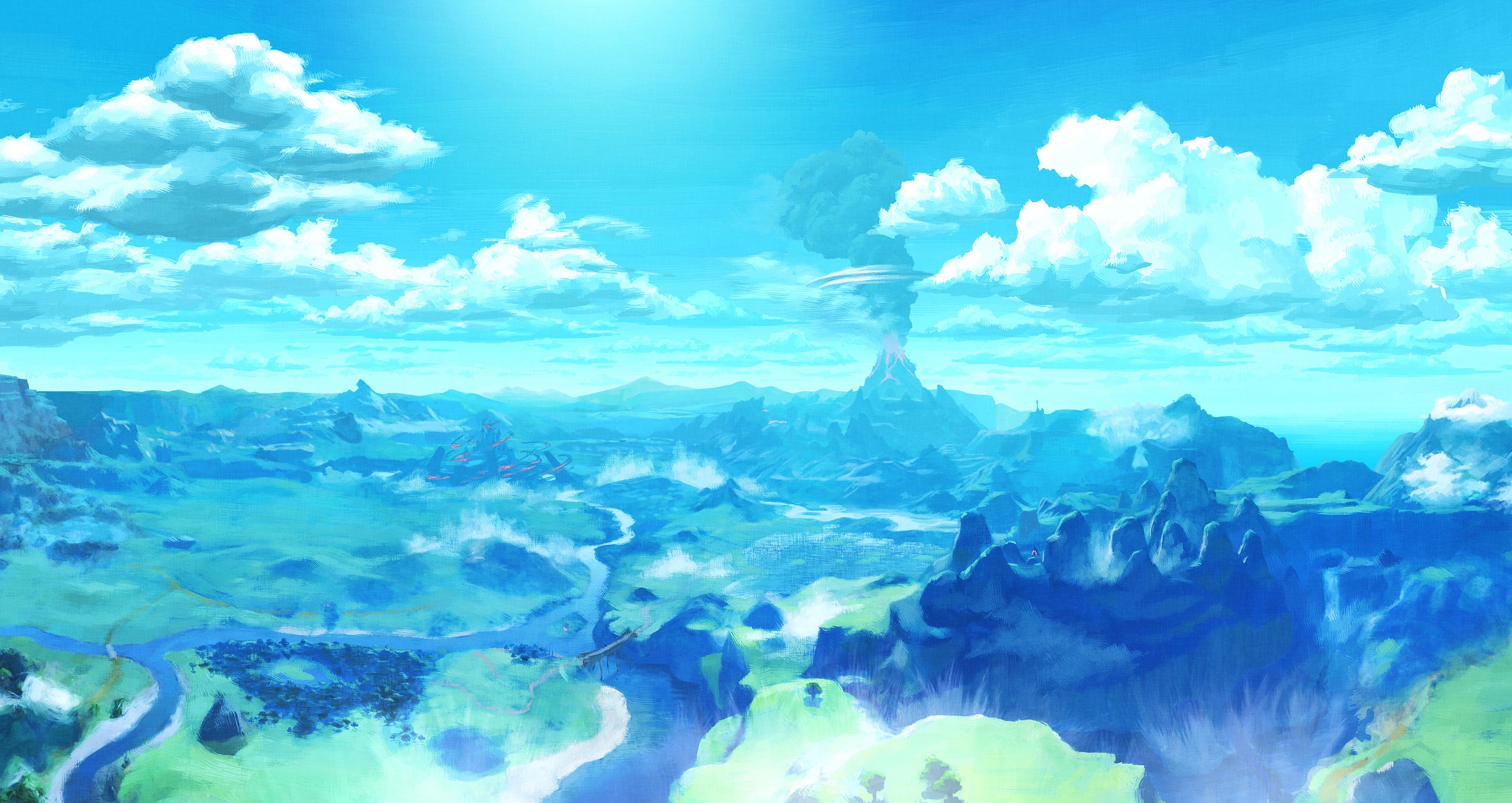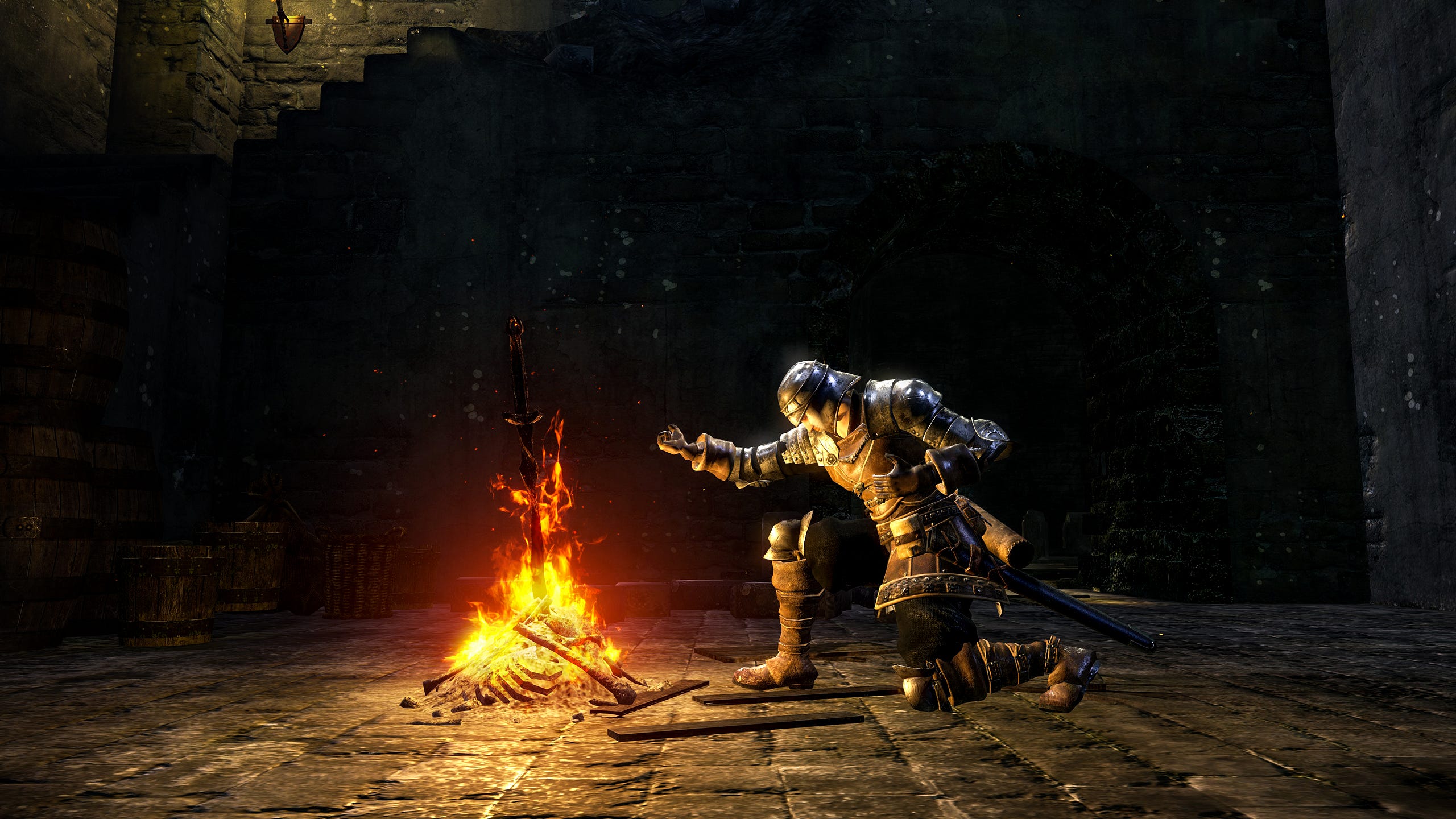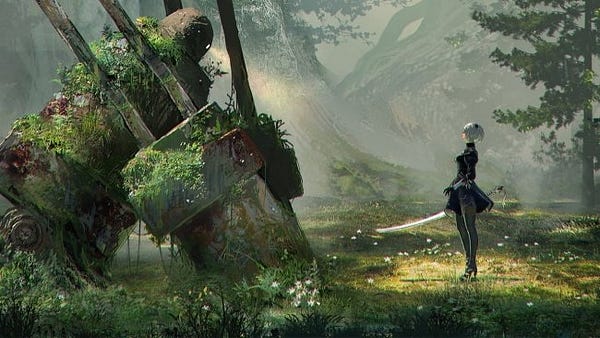Save Spaces: Exploring Tranquility in Games

In the beginning, it’s pitch black. You see nothing, but you hear the whisper of wind over water. The sounds build to a murmur, and you wake. You open your eyes to the familiar teal and blue-greens of the midday sky over the ocean. Clouds dot the horizon, accenting a picturesque ocean.
You’re viewing all of this from atop a wooden lookout on a small island, one of many connected by rope bridges. Far below there is a humble village, and you can make out the sounds of villagers trading, as well as a piglet snorting. The curious sounds of the village are replaced by a string quartet crescendo, followed by the inviting melody of a harp. As this happens, a warm ocean breeze tickles your skin. You feel as though you could lie atop this lookout forever. And then, off in the distance, you hear a piercing yet familiar cry: “Big brother!” The words “Outset Island” fade in at the top of the screen, and you are brought back to reality.
What you just read is the introduction to The Legend of Zelda: Wind Waker. Did it make you feel calm? That’s the intent.
When we reminisce about our favorite games, we often talk about the heartbreaking moments, gripping narrative, or clever gameplay. What’s not talked about is what sets up all of that: the calm before the storm.
Throughout the history of video games, especially role-playing games, game developers have taken us through serene woods, charming villages, warm beaches, and many more peaceful places, places with tranquility that only a game could provide. Much like books or movies, they use tranquility to establish perspective and ground us into the world. They do this to make us want to belong in the world. These places evoke emotions that appeal to our sense of home and safety.
 The Legend of Zelda: Breath of the Wild. Source: Nintendo.
The Legend of Zelda: Breath of the Wild. Source: Nintendo.
As you can probably guess, this is critical in storytelling. They get you invested in the story while setting the groundwork for tone shifts in the narrative. This strategy is extra important in video games, where the player has the opportunity to directly interact with environments.
For instance, if in a game you stumble across a village and bandits burn it down minutes after you arrive, you might feel some remorse, but you’re relatively unattached. On the other hand, imagine you spend the first ten hours of the game living in the village, developing relationships with the villagers, doing difficult quests, and returning to the village for a break after each. Now when the bandits burn your village down, it hits hard, and it sets up for the “storm”.
This happens all the time in games. In The Wind Waker, you’re forced to leave Outset Island to rescue your little sister, which then sets up the rest of the game.
Games also use the opposite approach: the storm before the calm. In this case, the calm area becomes a reward for overcoming the storm. Think of virtually any JRPG — it probably has a boss before a humble town or village tucked in the woods.
Moments that stay with you
I write frequently about the nostalgia value of games. What is it that the player will remember about a game in 1, 5, even 10 years? I believe it to be a crucial element to the experience, as games, much like a good book, can have a lasting impact on identity.
When I was young enough to not know why my parents were fighting but old enough to master a controller, I played my first Zelda game, Ocarina of Time. I played it on a frayed, black leather couch in the basement. I remember how hot that couch would get in the summers, so hot that my siblings and I would place blankets on it before we played. When my parents fought, I would gather my three younger siblings, lead them to the basement, cuddle up on that disgusting black couch, and boot up Ocarina of Time on the N64. And until my parents got tired or we all fell asleep, I would play Zelda with my siblings. I remember everything about that game. I will never forget, either, because it was such an experience that it was able to save me and my siblings from our troubled household.
Part of what makes the best of video games stand out in our minds is the tension between chaos and tranquility; however, often the tranquility is what sticks in the memory when we play something we like. That’s because good memories are sparked by this sense of bliss, especially when the bliss comes at the end of something or as a relief. And we as humans excel at remembering bliss. Our brain gives bliss preferential treatment — it appeals to the reward part of our risk-reward faculties. Conversely, we compartmentalize and try to forget the bad, the traumatic. There are studies suggesting that we remember bad memories in greater detail, perhaps as an evolutionary response to trauma. However, good memories tend to color an entire experience, especially when the experience ended on a good memory.
Take Dark Souls as an example. If you’ve finished any of the Souls games, you’re aware of how frustrating, even humiliating, they can be. And yet, they’re decade-defining games. People remember the adversity they overcame. Moreso they remember every trap and monster waiting to jump you, and around which corners they lurk. They remember the harrowing music and endless fighting. But they also remember the relief of stumbling upon a fire, praising the sun, saving their game, and taking in their journey.
 Dark Souls Remastered. Source: Bandai Namco.
Dark Souls Remastered. Source: Bandai Namco.
Think back to your favorite games. What comes to mind?
For me, I remember walking through the forest of Ellinia in Maplestory with my friends, mesmerized by the gentle melodies of Ellinia and the sprawling tree city. Or I think of the awe I felt stumbling into Stormwind City in World of Warcraft as a tween (or the first time I flew over it). I think of stumbling onto Epona’s Farm in Ocarina of Time and hearing Epona play that sad, calming tune off in the center of the horses, this strange, cut-off farm in Hyrule Field where a family lives in peace.
Seeing a trend? These memories are often tied to a location, one of positive significance, and typically peaceful. They’re places where you feel safe in a game. I call them Save Spaces.
Drawing you in
Now, save spaces do more than just establish memories. They also help you lose yourself in a game, which is to say, they make you feel like you’re in the game. This phenomenon is commonly referred to in the gaming community as immersion.
Save spaces are critical for establishing immersion.
 Nier: Automata. Source: Square-Enix.
Nier: Automata. Source: Square-Enix.
In Nier: Automata, a masterpiece of storytelling that I will refrain from spoiling out of respect for anyone who has yet to play it, the player is settled into a calm apocalypse. It’s clear at the outset of the game that something major happened and that we aren’t supposed to know or understand all of it. There’s a magic in that — in a game’s depth being larger than it actually is. That alone can suck a player in. I know I was. However, what makes this experience sink in is the paradoxical tranquility of it all. In this backward, seemingly demolished world, there is a resigned peacefulness. If you haven’t played Nier: Automata, well The Legend of Zelda: Breath of the Wild employs the same tactic (though, I will hear arguments that both of them are simply copying Shadow of the Colossus).
In either case, the world we’re thrown into appears as a shell of what it once was, a patch of old forest that has been burned into an uncomfortable oblivion. But what makes us need to explore, to lose ourselves in this mysterious apocalypse, are the traces of life sprouting back into view. In Nier, it’s the overgrown city ruins and small animals running around. In Zelda, it’s the sun peeking over a faintly recognizable Hyrule.
This tranquility makes us want to know what happened. It stirs up emotion, and it drives our interest in the game. That’s the power of save spaces. It is the reason why certain games, certain moments even, will always sit comfortably our memories, and it’s why I will continue to write fondly about them.